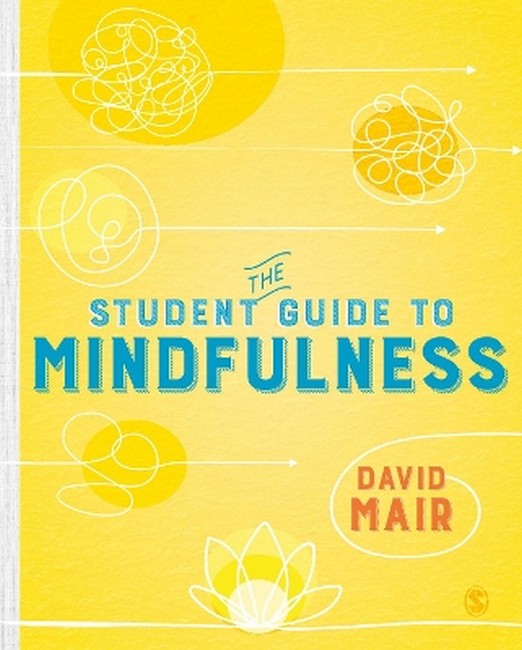Dr David Mair is a BACP Senior Accredited Psychotherapist with over twenty years experience of supporting students in university settings. He has led mindfulness groups for university staff and students, and believes - from his own experience as well as that of many others - that mindfulness offers a counter-cultural way out of suffering where awareness of self-imposed limitations, anxieties and fears has the potential to lead to greater freedom. Now semi-retired, he maintains a private therapy practice and continues to explore the impact of mindfulness on deep-seated emotions that arise from some of life's most stressful situations.
Request Academic Copy
Please copy the ISBN for submitting review copy form
Description
Chapter 1: Mindfulness and its benefits Chapter 2: Mindfulness and the brain Chapter 3: Mindfulness: formal and informal Chapter 4: Mindfulness and self-compassion Chapter 5: Mindfulness and depression Chapter 6: Mindfulness and perfectionism Chapter 7: Mindfulness and anxiety Chapter 8: Mindfulness and procrastination Chapter 9: Mindfulness and self-care Chapter 10: Mindfulness and the future
This is an invaluable resource for those working and participating in Higher Education. Its practical and straightforward approach is so helpful. Highly recommended. -- Paul Glynn This book condenses some of David Mair's considerable experience, wisdom, insight and humour gained over 20 years of student counselling within university settings, and written something all students should read. He's captured many of the day to day problems student report to our counselling services and also practicable strategies to help navigate the emotional maelstrom of university life. Mark Fudge, Head of Counselling and Mental Health Support, Keele University, Chair BACP - University and Colleges Division -- Mark Fudge Many students find mindfulness helpful and research shows us that it can help students improve their resilience to stress. This book very usefully shows how to develop a mindfulness approach to different student specific situations such as procrastination. Very easy to read and illustrated by useful case studies that directly relate to the student experience, readers can dip in and out of this beautifully written book and focus on the chapters that are particularly relevant to them. I recommend this book, a great and practical addition to the Mindfulness literature. -- Geraldine Dufour * one of the authors of A mindfulness-based intervention to increase resilience to stress university students (the Mindful Student Study): a pragmatic randomised controlled trial https://doi.org/10.1016/S2468-2667(17)30231-1 * I found Chapter 10 particularly helpful as a way of guiding young people who are extremely anxious about the unknown in their futures, a very difficult fear to allay and something I had been searching for help with. I would recommend this book to other Specialist Mentors as it offers hope and helps to make sense of confusing and conflicting thoughts, emotions and patterns which may otherwise hinder living a fulfilling and enjoyable life. The academic rigour of the book, as well as its accessibility, should appeal to students as well as to their mentors, although initially reading the book during the holidays might be necessary as although it offers practical advice and exercises, it does require deep consideration and a combining into the reader's personal philosophy, as David points out, for best effect. -- Cathy Fell The Student Guide to Mindfulness offers a comprehensive, straightforward and real-world approach to mindfulness. Its clear, succinct and non-jargonistic language makes it extremely accessible and highlights the benefits, as well as the limitations, of a mindfulness approach. There is an excellent distinction between informal and formal mindfulness, allowing the reader to identify ways of adding informal mindful practices to their daily routines, allowing us to 'wake up from the trance' and change our habitual thinking patterns. Stimulating, easy to read, explore and digest, I am certain it will become a must-have for any practitioner working within further and higher education. -- Alice Scott - University of the Highlands and Islands, Mental Health and Counselling Manager There was a particular chapter on the guide for mindfulness that left me surprised and really grabbed my attention. Usually, what I've encountered is always just related to anxiety and stress so this chapter really surprised me and I found myself identifying with everything in it. I've never thought of perfectionism as affecting me so much but besides the explanations provided, it was the 'typical thoughts and beliefs' that really touched me as I have all of them. I can't say 'I'm fixed', but I feel more aware. -- Birmingham City University Student My favourite tip from Mindfulness and it's benefits is that 'Mindfulness can enable you to be more present in your life and to 'wake up' from the trance of worry, anxiety and depression.' I like this quote because it reminds me of lifting a weight off of your back and allowing yourself to be stress-free. -- Naomi Somers

